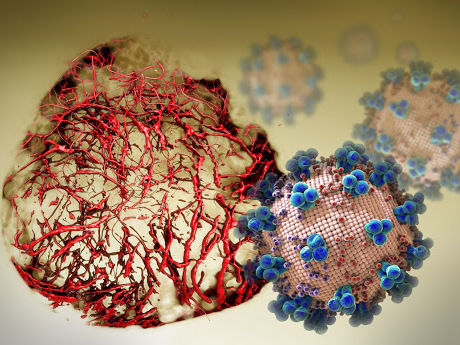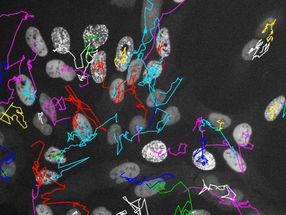Fighting SARS-CoV-2 in human blood vessel organoids
SARS-CoV-2, the virus causing coronavirus disease-19 (COVID-19), is spreading worldwide at a fast pace. In a concerted effort including researchers from IMBA – Institute of Molecular Biotechnology of the Austrian Academy of Sciences – a team of international scientists produced groundbreaking results in blocking viral infections in human organoids by inhibiting interactions with the SARS-CoV-2 receptor ACE2. The results are published in the renowned journal Cell.

The viral infestation of COVID-19 could be significantly reduced in blood vessel organoids by the administration of hrACE2.
(c)IMBA/Kulcszar
Declared a pandemic by the WHO, the world is currently facing the largest health crisis of the last decades. First reported in December 2019 in the Wuhan province of China, the virus SARS-CoV-2 causes the disease COVID-19, ranging from milder flu-like symptoms and fever to severe lung disease and multiple organ failure leading to fatalities.
The novel coronavirus shares many similarities with the original Severe Acute Respiratory Syndrome Coronavirus (SARS-CoV) which emerged 17 years ago and was extensively studied by the Penninger group at IMBA, who was among the first to describe ACE2 as host cell receptor of the original coronavirus.
Recent studies now confirmed that the novel coronavirus SARS-CoV-2 also binds to ACE2 in its host with even higher binding affinity – also explaining the severity of the disease.
ACE2 is mainly expressed in the human lung, which is why in most COVID-19 patients, the lungs are heavily affected by the virus. However, ACE2 is also found in additional tissues such as the human heart, kidneys, blood vessels and intestine, which might explain the multiple organ failure oftentimes caused by COVID-19.
In the recent study published in Cell, a joint international effort led by Josef Penninger with scientists from Austria, Canada, Sweden and Spain, published groundbreaking results as they were able to slow SARS-CoV-2 viral growth both in cell culture and human organoids. By using a clinical-grade human recombinant soluble ACE2 (hrsACE2) in cell culture, the viral infection was slowed 1000- to 5000-fold.
IMBA group leader and founding director Josef Penninger, who is now director of the Life Sciences Institute of the University of British Columbia, explains: “Due to the promising results in vitro, we wanted to test hrsACE2 in vivo – usually, human tests would take years to get the first results. However, we already engineered human capillary organoids at IMBA back in 2019, and in our amazing network of researchers we were able to rapidly generate human kidney organoids. These organoids are great tool to rapidly therapies in COVID-19 disease relevant-human tissue.”
These engineered human tissue organoids were infected with SARS-CoV-2 directly purified from a COVID-19 patient and were shown to be able to produce viral progeny in multiple experiments. Following infection with the virus, adding hrsACE2 to the organoids drastically reduced the viral infection, showing the incredible efficiency of the blocking effect.
Human recombinant soluble ACE2 (hrsACE2) was developed by the biotech company Apeiron Biologics and has already undergone phase 1 and phase 2 clinical testing in healthy volunteers and patients with lung disease. "We are delighted that this international collaboration, which has been so successful, has produced a solid data base that supports our proposed mode of action for the action of rhACE2, also known as APN01. This of course motivates us all the more to test the efficacy of APN01 in COVID-19 patients in controlled clinical trials," says Peter Llewellyn-Davies, CEO of Apeiron Biologics. Besides blocking the virus, APN01 was designed to protect multiple tissues, especially the lung, from failing.

























































